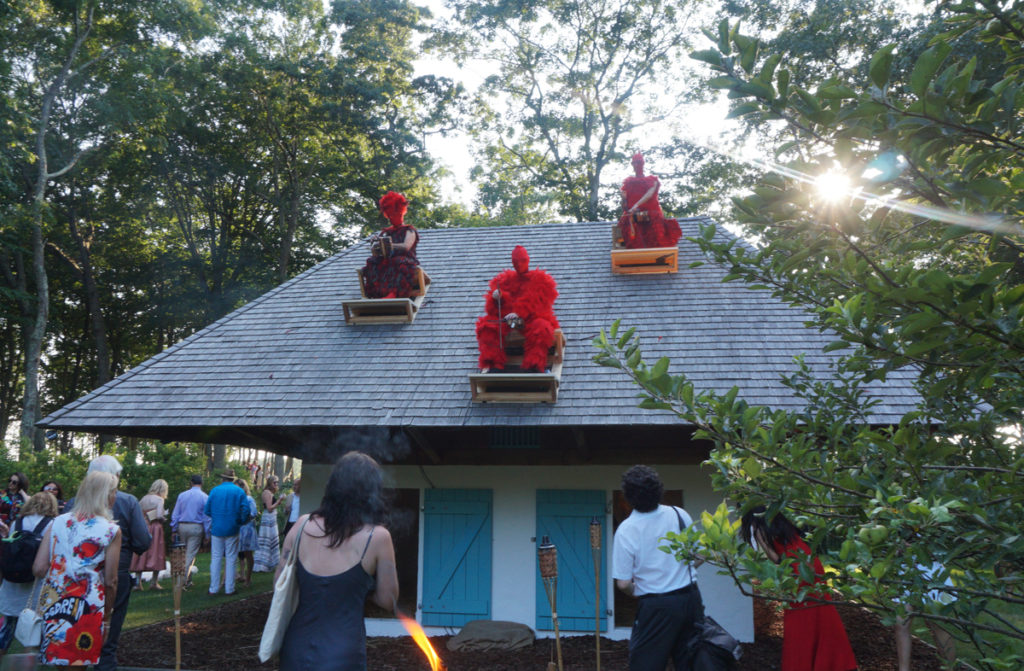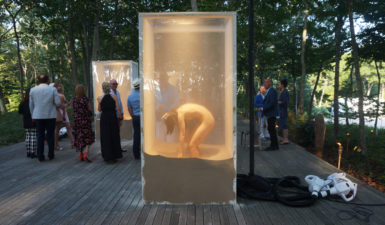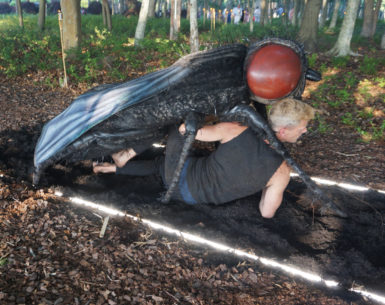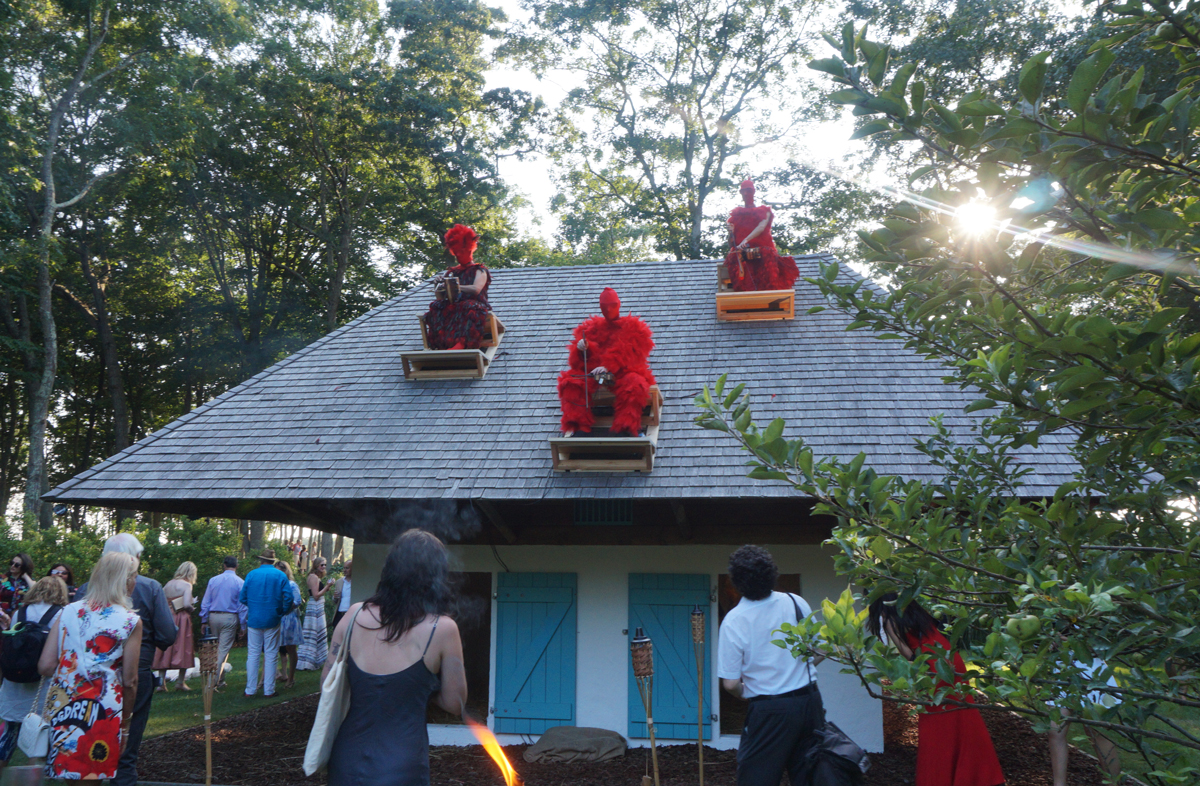[ad_1]

Jay Tan, Are You Talking to Me, 2019.
KATHERINE MCMAHON/ARTNEWS
The drums got louder as crowds came closer to the tree-lined entrance to the Watermill Center in the Hamptons this past Saturday. Equally exciting and menacing, the steady beat brought immediate tension to partygoers for the 26th annual Watermill Benefit. This year’s “Tabula Rasa”–themed event honored collector and philanthropist Katherine Rayner and artist Carrie Mae Weems. As usual, it was a day filled with bizarre sights.
By the time guests were at the gates, the percussion completely filled the air complementing the giant Santiago Sierra banner hanging from the trees, which bore the word “NO” in stark black and white lettering. The entrance foreshadowed a carnival of menacing, entropic art, curated by Noah Khoshbin and Ivan Cheng, that wrapped around the grounds like a highbrow haunted house.
“I’m going to cover your nose and mouth now,” a staffer warned a performer in Humberto Díaz’s It’s All In Your Head, who was about to be wrapped head-to-toe in plastic. He braced himself and was quickly stuck in place. Above him, on the roof of a barn, three performers were dressed in all red, their faces obscured, each holding a wooden instrument called a daxophone for Daniel Fishkin and Cleek Schrey and Ron Shalom’s piece Daxophone Consort. Their music recalled Hitchcock’s Psycho score, as they plucked strings menacingly, adding even more tension to the surrounding performers writhing in the grass, wrapped up like butchered meat.
The Watermill Benefit often felt like an homage to Ari Aster’s recent folk horror sensation Midsommar—especially when two attendants clinked cocktails beside the daxophone piece, giggling and repeating the Viking toast, “Skol!”

Ximena Garnica and Shige Moriya, Correspondances, 2019.
KATHERINE MCMAHON/ARTNEWS
One of the most visceral pieces included in the proceedings was Ximena Garnica, Shige Moriya and LEIMAY’s Correspondances. In three separate glass chambers partially filled with sand, nude performers donned gas masks as they tried to gain their footing and rise to the horizon. Periodically, leaf blowers attached to the chambers would switch on, disorienting the performers and sinking them back down to the bottom of the sand. One participant, just as he pulled his left foot out to meet his right, began to straighten his torso, but his chamber, looking womb-like as the sun reflected off the sand, betrayed him and sand flurried like a monsoon. The effect was claustrophobic and exhilarating.
“Every year they try to get weirder and weirder,” one veteran of the Watermill soirée reported. “I love it, though—it’s why I come back!”
The evening was attended by many familiar faces, including guests such as White Cube director Eric Shiner, MoMA curator Stuart Comer, collector Maja Hoffman, writer and Jeff Koons biographer Linda Yablonsky, and Isabella Rossellini, who of course cannot be defined by any single label. Also spotted: Commerce Secretary and Magritte collector Wilbur Ross, who made a brief appearance with his wife, a couple weeks after being held in criminal contempt by the U.S. House of Representatives.

Jakob Falkowski, The Purger 2019.
KATHERINE MCMAHON/ARTNEWS
Eventually, guests were seated for dinner, where ARTnews Top 200 collector Raymond McGuire introduced the event’s honorees. First he mentioned Rayner, who serves on the board of the New York Public Library and provided a $15 million gift to establish the Katharine J. Rayner Fund for Special Collections. McGuire noted, “As a fellow board member, I have witnessed her having informed judgement and deep intellect. When she speaks, she commands the room.”
“And what about our other honoree?” MacGuire continued, introducing Weems to thunderous applause. “Carrie Mae Weems is a genius. Carrie Mae Weems rewrote the rules of image-making. Carrie Mae Weems is the first African-American woman to have a retrospective at the Guggenheim. Her gift of intellect and courage has influenced and inspired the entire Western cultural canon.”
A large banner by Weems reading “Change Requires 2020 Vision” was sold by the indefatigable Simon de Pury for $50,000, with a portion of the proceeds going to the Center for Refugee Services. Later in the night, Weems could be seen getting down on the dance floor at the afterparty to the music of DJ Kitty Cash.
Other pieces sold in the charity auction were a Katherine Bernhardt, which netted $35,000, Christopher Makos portrait of Andy Warhol, for $30,000; and a Robert Wilson video portrait of Pope L., which went for $65,000.
The evening was capped off by Helga Davis singing a bare, soulful version of “Perfect Day” by Lou Reed, accompanied by a single electric guitar. Several in the crowd were misty-eyed. Her voice wavered off after the final “You’re going to reap just what you sow.” And then the afterparty began.
[ad_2]
Source link

